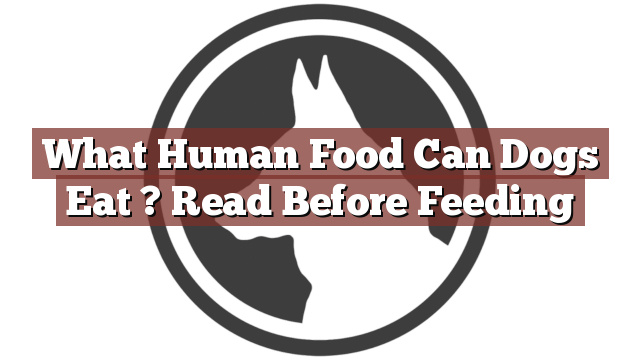Understanding Your Dog’s Dietary Needs
As a responsible pet owner, it is essential to understand your dog’s dietary needs. Dogs are primarily carnivores, meaning their bodies are designed to digest and derive nutrition from meat. While they can benefit from certain fruits, vegetables, and grains, their main source of nutrition should come from a high-quality dog food specifically formulated for their needs. It is important to note that not all human food is safe for dogs, and feeding them an inappropriate diet can lead to health issues.
What Human Food Can Dogs Eat? Read Before Feeding
Now, let’s discuss what human food dogs can safely consume. It is crucial to always consult with your veterinarian before introducing any new food into your dog’s diet. However, there are a few human foods that are generally safe for dogs to eat in moderation. These include:
- Lean Meats – Dogs can eat lean meats such as chicken, turkey, and beef. Make sure to remove any bones, skin, or excess fat before feeding it to your dog.
- Fruits – Some fruits are safe for dogs and can even provide them with essential vitamins and minerals. These include apples (without seeds), bananas, blueberries, and watermelon (without seeds or rind).
- Vegetables – Certain vegetables are safe for dogs and can be a healthy addition to their diet. These include carrots, green beans, peas, and sweet potatoes (cooked and without seasoning).
- Grains – Dogs can tolerate some grains, including rice and oatmeal. These can be beneficial sources of carbohydrates for them.
Remember, even when feeding these safe human foods to your dog, it should only be done in moderation and as a supplement to their regular dog food.
Pros and Cons of Feeding Human Food to Dogs
Feeding your dog human food can have both pros and cons. On the positive side, incorporating some safe human foods into your dog’s diet can provide variety and potential health benefits. For example, certain fruits and vegetables can be a great source of fiber, vitamins, and antioxidants. It can also help in training and bonding with your furry friend, as some dogs find human food more enticing.
However, there are potential drawbacks to consider. Feeding your dog human food may disrupt the nutritional balance of their diet, as it may not provide all the necessary nutrients in the correct proportions. It can also lead to obesity or digestive issues if not done carefully. Additionally, some human foods can be toxic to dogs, such as chocolate, grapes, onions, garlic, and certain artificial sweeteners like xylitol. It is crucial to be aware of these toxic foods and avoid them altogether.
Conclusion: Ensure a Balanced and Safe Diet for Your Furry Friend
In conclusion, while dogs can eat certain human foods, it is important to always prioritize their overall nutritional needs. Before introducing any new food into your dog’s diet, consult with your veterinarian to ensure it is safe and appropriate. Remember that moderation is key, and human food should never replace a high-quality dog food specifically formulated to meet your dog’s dietary requirements. By providing a balanced and safe diet for your furry friend, you can ensure their overall health and well-being for years to come.
Thank you for taking the time to read through our exploration of [page_title]. As every dog lover knows, our furry friends have unique dietary needs and responses, often varying from one canine to another. This is why it's paramount to approach any changes in their diet with caution and knowledge.
Before introducing any new treats or making alterations to your dog's diet based on our insights, it's crucial to consult with a veterinarian about [page_title]. Their expertise ensures that the choices you make are well-suited to your particular pet's health and well-being.
Even seemingly harmless foods can sometimes lead to allergic reactions or digestive issues, which is why monitoring your dog after introducing any new food item is essential.
The content provided here on [page_title] is crafted with care, thorough research, and a genuine love for dogs. Nevertheless, it serves as a general guideline and should not be considered a substitute for professional veterinary advice.
Always prioritize the expert insights of your veterinarian, and remember that the health and happiness of your furry companion come first.
May your journey with your pet continue to be filled with joy, love, and safe culinary adventures. Happy reading, and even happier snacking for your canine friend!

